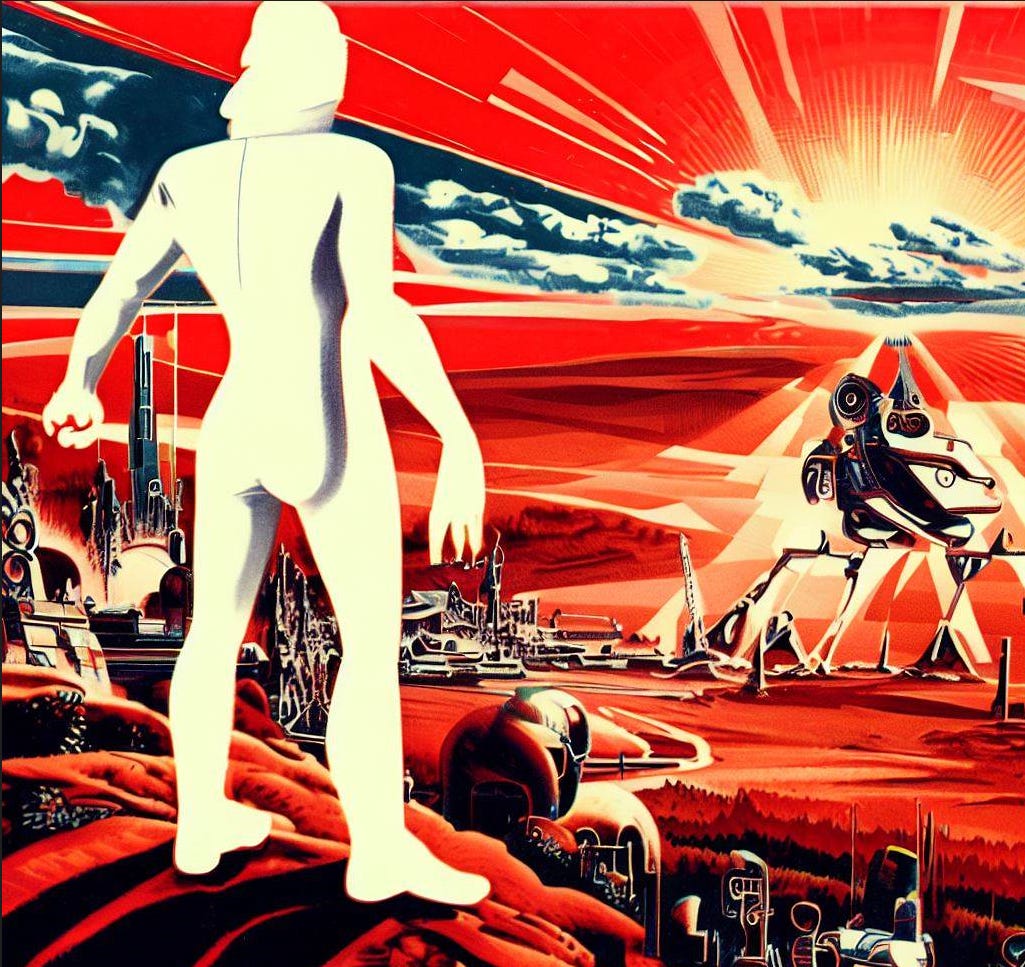“The best way one can predict the future - is by creating it.”
-various attributions
The stories that we tell are reins of the chariot of progress. Narratives are what define and perpetuate ideology, religion, and our individual philosophies. It is vital for ourselves, our children, and humanity’s future that we create, reimagine, and adapt narratives to build and perpetuate the future that we want.
Much like everybody else, my own views, life mission, and outlook - are products of the mythos of the environment I developed within. Being exposed to the carcass of the Soviet technological space dream through cultural ties, and seeing the rebirth of Western techno-optimism in the 2010s, I have dreamt of the stars from as early as I can remember. This led to an addiction of consuming science fiction, eventually with only convincing hard science fiction giving enough kick to feel something. But like every addiction, tolerance grows, and living in the future that Asimov, Lem, and Clarke dreamt of is the only fix I can get nowadays. This past year has started to feel like the beginning of the fulfilment of that fantasy.
The stories we tell matter: Carrot
Elite athletes use visualisation to perform at their peak on the field or in competition. They plan their body’s kinematics, reactions, and imagine themselves as champions before finally achieving gold. The self belief and the ambitious intentional planning of visualisation enables elite performance. In a similar way our ancestors told stories of exploration, perfect societies, god-like powers, heroism, and glory. Not every athlete has achieved gold, and not all of our past fantasies have been realised. Nevertheless, we live in abhorrent luxury compared to kings only a few hundred years ago, and athletes who visualised and tried their best still perform superhumanly.
“Shoot for the moon, if you miss, you’ll land among the stars.”
Ever since The Enlightenment we have been transitioning towards a scientific society that values knowledge, and can provide support for the needy with its excesses. In the 17th century, Francis Bacon published his vision of an ideal society in his work "New Atlantis." He envisioned science and technology being used to solve societal problems and improve the lives of all citizens. Bacon’s optimism and faith in humanity described a system where scientific research and progress are a priority. His work helped to inspire the scientific revolution and the Age of Enlightenment, which led to tremendous advancements in science, technology, and social welfare. Many of his predictions are still science fiction today - such as genetically engineered animals and plants providing post-scarce sustenance to all.
Our ability to ambitiously speculate on the future of society, technology, and human abilities is what has driven our wealth and wellbeing since before the dawn of agriculture. Our epics, and more recently our science fiction, are for human civilisation what visualisation is for Olympians. By imagining a great future, we can set goals, create plans, cultivate self-belief, and take action to move us towards utopia.
The stories we tell matter: Stick
Not all of our epics are optimistic, in fact most carry a warning. The aspirational strength of Achilles came with a fatal flaw, the gift of Midas came with a curse, Atlantis sunk for a reason. Powerful wish-granting beings have twisted the desires of human heroes in almost every culture’s lore. In Eden, the sin of curiosity has been punished, and our ambition curtailed by the gods in the myth of Prometheus.
As we have transitioned from a few thousand bipedal mammals that occasionally hunt megafauna to extinction to nuclear arsenal holding, terraform-capable, space-travelling, globe-spanning mega-civilisation building, capitalist neo-monkeys we’ve had to confront the ancient warnings of our ancestors. Human power can offend the gods, bringing plague, destruction, and corruption upon the environment, the perpetrators, and their bloodlines. As a famous arachno-hominid’s relative once said “with great power comes great responsibility”.
Our ancient stories encouraging caution and humility in the face of great capability are clearly not uncalled for. Human-caused climate change, mass extinction of flora and fauna, and the ever-present threat of nuclear war are proof of that. However, their conflict with the optimism of our aspirations will not save us from doom. Twentieth-century environmentalism was ardently anti-nuclear and bears much of the responsibility of our poor energy diet with industrialists. Had The West not been so afraid of the godlike power of hot rocks, perhaps using the French energy grid as an example, climate change would never have gotten bad enough to seriously enter the public’s consciousness.
Stories of warning play an important role as we start climbing the Kardashev scale. We should ensure our creations do not enslave our fellow man, destroy the beauty of our world, and must always be wary of unintended consequences. But this is not rationale to slow down progress - rather, it is motivation for us to gain the intelligence and knowledge to make the right decisions, and the capabilities and wealth to action them.
Let’s build
Optimism, urgency, ambition, and a willingness to adapt are key markers of success in athletes and students, so why not civilisations? We can build the future we want by shaping ourselves and our circles to exemplify these tenets - building the narratives that turn science fiction to science fact. I believe storytelling is the most important condition for us to instill these traits into ourselves.
If you would like to install powerful visions of the future to your psyche full of aspirations and warnings I would like to suggest a few starting points:
All Possible Views About Humanity's Future Are Wild - Holden Karnovsky (2021)
Manna: Two Views of Humanity’s Future - Marshall Brain (2003)
Diaspora - Greg Egan (1995)
2001: A Space Odyssey - Arthur C Clarke (1967)
Snow Crash - Neal Stephenson (1992)
Let’s dream, let’s read, let’s write, let’s build.

